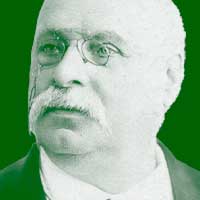Emil Waldteufel - Biography
Emil Waldteufel Biography
Emile Waldteufel (December 9, 1837 - February 12, 1915) was a French composer of popular music as well as waltzes and polkas.
Emile Waldteufel was born in Strasbourg, France. The name 'Waldteufel' sounds German, which stems from the fact that the Alsace was a former German territory that had been part of France since 1793. Although not generally known, his ancestry was also Jewish.
Waldteufel was born into a family of musicians. His father, Louis, had a well-reputed orchestra, and his brother Léon was a well-liked musician. When Léon got a place at the Conservatoire de Paris as a violin student, the entire family moved there. It was in Paris that Emile would spend the rest of his life.
He studied the piano at the Conservatoire de Paris from 1853 to 1857. Among his co-disciples was Jules Massenet, the famous opera composer. During this time, his father's orchestra became one of the most famous in Paris, and he was frequently invited to play at important events.
At the age of 28, Emile became the court pianist of Empress Eugénie. After the Franco-Prussian War, the orchestra played at the President's balls in the Elysée Palace. At this time only a few members of the French high society knew of Emile, and he was already 40 before he became better known.
In October, 1874 Waldteufel played at an event that was attended by the Prince of Wales and future King of England, Edward VII. The Prince was enthralled by Waldteufel's 'Manolo' waltz, and was prepared to make Waldteufel's music known in England. A long-term contract with the London-based editor Hopwood & Crew followed. Part of the company belonged to Charles Coote, director of the Coote & Tinney’s Band, the first dance orchestra in London. Through these means, Waldteufel's music was played at Buckingham Palace in front of Queen Victoria. Waldteufel dominated the music scene in London and became world-famous. During this period he composed his best known works, many of which are still heard today around the world. He became well-known for the waltz 'Les Pâtineurs' or the 'Ice Skaters', created in 1882.
Emile Waldteufel gave concerts in several European cities, such as London in 1885, Berlin in 1889 and the Paris Opéra Balls in in 1890 and 1891. He continued his career as conductor and writing dance music for the Presidential Balls until 1899 when he retired.
In 1915 Emile Waldteufel died at the age of 77 in Paris. His wife Célestine Dufau, a former singer, had died during the previous year. They had two sons and a daughter.
Waldteufel conducted with a stick rather than the violin bow. His compositions were first created at the piano and later orchestrated. The typical Waldteufel orchestra consisted of strings and a doubled woodwind section, two cornets, four horns, three trombones, and a tuba, along with some percussion instruments.
His music can be distinguished from Johann Strauss II's waltzes and polkas in that he used subtle harmonies and gentle phrases unlike Strauss' more robust and 'masculine' approach. It was considered that Waldteufel's music was not revolutionary, which explained why his waltzes fell out of favor as the age of Impressionism came to Paris.
Works of Waldteufel
- Les Pâtineurs waltz op. 183 The Skaters (1882)
- Très Jolie waltz op. 159 Very Lovely! (1878)
- Estudiantina waltz op. 191 Band of Students (1883)
- Pomone waltz op. 155 Pomona (1877)
- España waltz op. 236 (1886)
- Solitude waltz op. 174 (1881)
- Les Sirènes waltz op. 154 The Sirens (1878)
- Pluie de diamants waltz op. 160 Rain of Diamonds or Golden Rain (1879)
- Mon rêve waltz op. 151 My Dream (1877)
- Violettes waltz op. 148 Violets (1876)
- Rococo-Polka op. 232 (1888)
- Ma charmante waltz op. 166 My Charming Lady (1879)
- Vision valse op. 235 Visions (1888)
- Dans le champs polka-mazurka op. 125 In the Fields (1868)
- Les Grenadiers military waltz op. 207 The Grenadiers (1886)
- Térésa (Antoinette) waltz op. 133 (1864)
This biography is published under the GNU Licence
